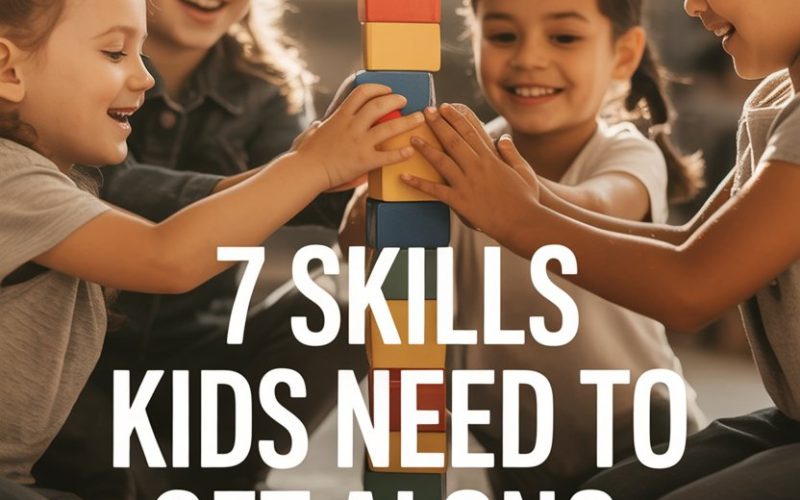Children are born experts at creating noise and messes. As for creating harmony? That bit takes practice.
If you’ve ever watched a toddler “share” a toy, you know exactly what I mean. Cooperation doesn’t sprout overnight—it’s encouraged, watered, and occasionally pruned (preferably before any hair is pulled out, yours or theirs).
Getting along with others is one of those life skills that pays dividends well beyond the playground. It helps kids feel confident, build lasting friendships, and, one day, survive group projects at work without plotting a dramatic exit.
Here are seven must-have skills for kids to thrive socially—and a few tricks to make these lessons stick.
1. Listening That Goes Beyond Nod-and-Zone-Out
We all know the difference between someone who’s actually listening and someone mentally rehashing their lunch order. Children are no different; real listening is a learned art.
The trick isn’t forcing children to sit in monk-like silence, but showing them how to pay attention to both words and feelings. When your child tells you about a spat with a friend, resist the urge to solve it right away.
Instead, reflect back what you hear—“Sounds like you felt left out when Anna didn’t let you join the game?” This models empathy and signals that their words matter.
Playing “telephone” (the whispering game, not actual mobile devices) can sharpen attentive listening. Even storytime can be interactive: ask silly questions or encourage your child to predict what happens next.
The goal? Make listening something kids want to do, not just another grown-up demand.
2. Speaking Up Without Steamrolling
Assertiveness is a beautiful thing—except when it tiptoes into bossy or bulldozing. Kids need to know their voice matters, but also learn when to let others have their turn.
Practice by giving them low-stakes chances to speak their mind: let them order at a restaurant, or decide which family activity comes next.
Encourage “I” statements—like “I feel upset when you take my crayons,” instead of “You’re mean!”—which help kids express feelings without accusing others.
Role-playing can work wonders here. Take turns acting out scenarios: someone cutting in line, a friend refusing to share, or a sibling who “borrows” their favourite jumper.
Guide them toward responses that are clear, kind, and don’t require shouting over everyone else.
3. Reading the Room (and Faces, and Moods)
Recognising social cues can seem like wizardry to some children, especially those who are neurodivergent or just still finding their feet in social circles.
Facial expressions, tone of voice, body language—all these tiny signs add up to understanding what others are feeling.
Picture books with expressive artwork are fantastic for practicing this skill. Pause and ask your child: “How do you think she feels right now? What do you see that tells you that?”
For a little more fun, try making faces in the mirror together and guessing each other’s emotions. (Bonus: it’s impossible to stay grumpy while pulling your best “surprised hedgehog” face.)
If your child tends to miss cues, create a secret signal between you—maybe a tap on the shoulder or a hand gesture—that means “pause, look around.” This gentle nudge can become their social safety net.
4. Sharing Without the Sulk
Sharing is a perennial classic for a reason. Toys, snacks, the last seat on the sofa—pint-sized negotiations happen all day long.
It’s tempting to swoop in and referee, but stepping back helps kids stretch those sharing muscles. Set ground rules (everyone gets a turn, no snatching) and let them work things out, with support as needed.
Praise those moments of generosity—positive reinforcement sticks far longer than lectures ever will.
For kids who struggle, use a timer to make turns feel fair and predictable. Or, arrange playdates with activities designed for teamwork, like building a fort or making a pizza together.
The messier, the better—cooperation feels most rewarding when there’s a shared goal, and cheese everywhere.
5. Managing Big Feelings Without Erupting
Strong emotions are part of the package deal with kids. What matters is how they manage those feelings when disappointment or frustration hits.
Model self-regulation by narrating your own calm-down strategies (“I’m feeling cross, so I’m going to take three deep breaths before I talk”).
Give your child simple tools: deep breathing, counting to ten, squeezing a soft toy. Even young children can learn to pause, breathe, and then respond, not react.
Stories can be powerful teachers here. Books like “The Feelings Book” by Todd Parr help normalise emotions and offer coping ideas.
For older kids, journaling or drawing can provide a low-pressure outlet for big feelings.
6. Problem-Solving Like a Playground Pro
Conflicts are inevitable, from who gets the last biscuit to who decides the game’s rules. Rather than fixing every quarrel for your child, help them become their own problem-solver.
Encourage them to name the problem, brainstorm a couple of solutions (no, “throw a wobbly” doesn’t count), and pick one to try. Afterwards, chat about what worked and what might be different next time.
Games like “Would You Rather?” are more than just car-ride time-killers—they give kids a chance to weigh options, justify choices, and see that there’s rarely only one right answer.
Over time, children who practise this approach become more adaptable, resilient, and (with luck) less likely to bite someone over a toy truck.
7. Apologising Without Mumbling (or Eye-Rolling)
Saying sorry is a social superpower—when it’s genuine. Kids need to learn that apologies aren’t just about ticking a box (“Sorry, can I play now?”), but about taking responsibility and repairing a rift.
Model authentic apologies yourself. “I got frustrated and snapped earlier, and I’m sorry. Next time, I’ll use my calm voice.” This shows kids that grown-ups are still learning, too.
Try practising apologies at home—not just after spills or spats, but in playful ways. Stuffed animals can “accidentally” knock each other over, or you and your child can take turns pretending to fix a silly mistake.
The goal is to make apologies less scary and more about making things right.
Raising Social Butterflies, One Messy Moment at a Time
Children are gloriously unpredictable.
What works today might fizzle tomorrow. Some days, your little darling will charm everyone in the queue at the shop; other days, you’ll be that parent in the car park negotiating over a toy potato.
Every nudge you give in the right direction—listening, sharing, managing feelings—adds up.
Social skills aren’t taught in a single day (if only!), but with patience, laughter, and a few creative strategies, every child can learn to get along with others.
And when all else fails? There’s always chocolate for you, and a deep breath for both of you.





